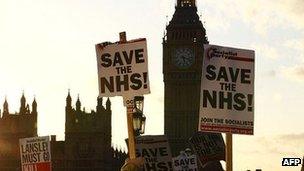NHS bill: GPs offer to help with health changes
- Published

The bill has provoked opposition from several professional bodies
The Royal College of GPs has indicated it is willing to work again with the government on implementing changes to the NHS in England, it has emerged.
The body had been omitted from talks since declaring its opposition to the Health and Social Care Bill last month.
Its head, Clare Gerada, said members had not changed opinion but were willing to help "find a way forward".
She said the royal college still wanted the bill withdrawn but it was time to "stop polarising" the debate.
Chief among their concerns is the government's determination to introduce greater competition into NHS provision.
The bill aims to allow more private companies and voluntary organisations to compete with NHS providers, something critics fear could damage the health service and undermine the drive towards integration of care.
Under the plans, family doctors are expected to play a key role in managing the NHS budget.
This initially won the backing of the Royal College of GPs (RCGP) but it eventually came out against the bill, saying it could prove hugely expensive, increasing "damaging" competition and widening health inequalities.
However, in a letter to Prime Minister David Cameron, Dr Gerada expressed hope of finding an "acceptable way forward" to achieve a better service for patients.
She stressed her group did "not agree on the need for, and potential impacts of, parts of the proposed legislation".
But she added: "I hope you will consider the wealth of experience that the RCGP represents, and will look at ways for us to work together to make the health service secure, stable, and safe, now and in the future."
Dr Gerada told the BBC on Tuesday: "We still want this flawed bill, this complicated, complex bill to be withdrawn.
"But we're not politicians, we're doctors, and it's the 33,000 family doctors across England that are going to have to make the health service work for their patients.
"The letter to the prime minister was one of many that we've written to him over the last 18 months saying 'let's stop polarising this debate, lets see if there's some common ground for the sake of our patients, for the sake of the NHS'."
The RCGP later issued a statement reiterating its position had not changed, but suggesting it needed to be practical because GPs would be leading the changes.
Other bodies opposed to the bill include the three major health unions, the British Medical Association and the Royal Colleges of Nurses and Midwives.
'Chaos'
The emergence of the RCGP letter comes on the day False Economy, the TUC-backed research group, claimed to have gathered evidence showing doctors, nurses and practice managers are having to spend time away from their day jobs to set up clinical commissioning groups.
Data from 106 of the GP-led groups - under half the total - suggested that in some cases, the responsibilities were taking up four days a week.
False Economy said this was likely to mean that locums were having to pick up the slack, and that the reorganisation was causing "chaos" in the health service.
Meanwhile, Labour leader Ed Miliband urged MPs of all parties to use a debate on Tuesday - prompted by an e-petition - to state their opposition to the changes.
"I would appeal to MPs from all parties to stand back, recognise these concerns and take this final opportunity in the House of Commons to reject this bill," he said.
The government has already made several amendments to the bill aimed at appeasing its critics, including greater patient involvement and strengthening the role of the watchdog Monitor in requiring providers to promote integrated healthcare.
But at their spring conference on Sunday, Liberal Democrat activists voted 317 to 270 to reject a motion expressing support for those concessions.
That effectively signalled their opposition to the bill as a whole. While not binding, it puts pressure on Lib Dem peers considering whether to support the bill when it returns to the House of Lords next week.
But Health Minister Simon Burns said: "Patients want doctors to make decisions about their care, not managers, and that is what our reforms will deliver."
The changes would improve services for patients while saving billions in administrative costs, to be reinvested in healthcare, he said.